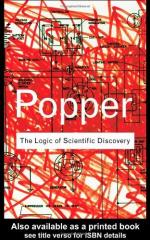|
This section contains 1,046 words (approx. 3 pages at 400 words per page) |

|
Popper
Popper is a highly influential twentieth-century philosopher whose views on how scientific knowledge is discovered have remained important concepts in the development and evolution of scientific thought. His denial of the long-standing principle that scientific knowledge is arrived at through induction led to new ways of viewing what can be counted as scientific knowledge. Two major contributions are his considerations of what science is and how scientific knowledge emerges. The lines he draws between science and non-science refute induction in favor of falsifiability as the basis of scientific knowledge.
Creative imagination plays a key role in Popper's view of the growth of scientific knowledge. However, creative ideas must be subject to rigorous and repeated tested as described in his doctrine of falsifiability. For Popper, distinguishing science from pseudo-science means coming to terms with metaphysics. His disagreements with Heisenberg and other quantum physicists are consistent with his requirement of...
|
This section contains 1,046 words (approx. 3 pages at 400 words per page) |

|




